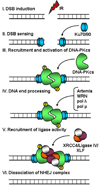Targeting nonhomologous end-joining through epidermal growth factor receptor inhibition: rationale and strategies for radiosensitization
- PMID: 20832017
- PMCID: PMC2941735
- DOI: 10.1016/j.semradonc.2010.05.002
Targeting nonhomologous end-joining through epidermal growth factor receptor inhibition: rationale and strategies for radiosensitization
Abstract
DNA double-strand breaks (DSBs) are the most lethal type of DNA damage induced by ionizing radiation or chemotherapeutic drugs used to eradicate cancer cells. The ability of cancer cells to effectively repair DSBs significantly influences the outcome of therapeutic regimens. Therefore, a new and important area of clinical cancer research is the development of DNA repair inhibitors that can be used as radio- or chemosensitizers. Nonhomologous end joining (NHEJ) is the predominant pathway for the repair of radiation-induced DSBs. A series of recent reports indicates that the epidermal growth factor receptor (EGFR) or its downstream components may modulate NHEJ through direct interaction with the DNA repair enzyme, DNA-dependent protein kinase. Because EGFR is overexpressed or activated in many cancers, these findings provide a compelling rationale for combining radiotherapy with therapies that block EGFR or its downstream signaling components. In this review, we delineate how these novel connections between a cell-surface receptor (EGFR) and a predominantly nuclear event (NHEJ) provide vulnerable nodes that can be selectively targeted to improve cancer therapy.
Copyright © 2010 Elsevier Inc. All rights reserved.
Figures


References
-
- Martin SA, Lord CJ, Ashworth A. DNA repair deficiency as a therapeutic target in cancer. Curr Opin Genet Dev. 2008;18(1):80–86. - PubMed
-
- Weinstein IB. Cancer. Addiction to oncogenes--the Achilles heal of cancer. Science. 2002;297(5578):63–64. - PubMed
-
- Halazonetis TD, Gorgoulis VG, Bartek J. An oncogene-induced DNA damage model for cancer development. Science. 2008;319(5868):1352–1355. - PubMed
Publication types
MeSH terms
Substances
Grants and funding
LinkOut - more resources
Full Text Sources
Other Literature Sources
Research Materials
Miscellaneous

